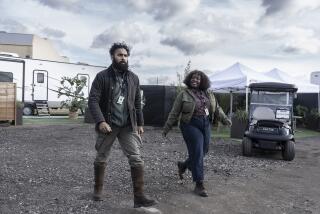Movie review: In ‘The Avengers,’ a Marvel-ous team
“The Avengers”are here, and resistance is futile.
Even if you’re frustrated by the relentless calculation of Marvel Studios’ plan for world cinema domination, fed up by the shameless way the studio used several of its earlier, at times pro forma superhero movies to promote this one, even if you don’t particularly like comic-book adaptations, this film just might make a believer of you.
That’s because, just like Nick Fury (Samuel L. Jackson), the über-calculating director of S.H.I.E.L.D. who calls on the Avengers when the fate of the world is at stake, Marvel has gone to its own version of the A-team when the franchise needed it most. That would be Joss Whedon.
PHOTOS: ‘The Avengers’ premiere
As screenwriter, sharer of story credit with Zak Penn and director, Whedon is the key reason why this $220-million behemoth of a movie is smartly thought out and executed with verve and precision. It may be overly long at two hours, 23 minutes, but so much is going on you might not even notice.
Whedon’s biggest success, creating TV’s “Buffy the Vampire Slayer,” was nowhere near this scale. But he is a third-generation television writer who was nominated for an Oscar for co-writing”Toy Story,” and he’s got an innate gift for bringing stories like this to life with the energy and intelligence that should be popular entertainment’s birthright but rarely is.
For starters, the film’s numerous action set pieces, including a whopper of an alien invasion of Manhattan that was so enormous it had to be shot in Cleveland, are crisply done with minimal dead time and few perfunctory elements.
But what really makes the difference in “The Avengers” is the emphasis on character as the film’s storytelling core. Many of the superheroes, including Iron Man (Robert Downey Jr.), Captain America (Chris Evans) and Thor (Chris Hemsworth), have had features of their own, but both what they say and how they say it is a step up here.
Because Whedon’s dialogue is less glib than the Marvel norm, with lines written as if they meant something, not to mention often being genuinely funny, the total effect brings the film closer to the tone of the original 1960s books, which revolutionized the comic world by presenting superheroes who were deeply involving, troubled individuals.
It is part of Whedon’s style here to throw the audience into the middle of the action, then backtrack to bring viewers up to speed. “The Avengers” begins with some nefarious aliens gleefully writing Earth’s obituary (“The humans, what can they do but burn?”), and the bad news that the Tesseract, a tiny but enormously powerful extraterrestrial energy source, has started to act up.
That acting up opens a portal to the other side of space, and who should arrive on our planet but the Norse god Loki (the exemplary Tom Hiddleston), up to no good. “I am Loki of Asgard, burdened with glorious purpose,” he says by way of introduction before killing everyone in sight and using his scepter to turn ace S.H.I.E.L.D. archer Clint Barton, a.k.a. Hawkeye (Jeremy Renner), into his brainwashed tool.
Loki’s goal, as it turns out, is to make a deal with those shadowy aliens and end up ruling we feeble earthlings, a species he feels is ripe for the picking. “The unspoken truth is that you yearn for subjugation, you are made to be ruled,” is the way he puts it. What a diplomat.
Talk like this causes Fury (whose organization is not called Strategic Homeland Intervention Enforcement Logistics Division for nothing) to declare that a state of war exists and mobilize agents like the deadly Natasha Romanoff, a.k.a. Black Widow (Scarlett Johansson) into full combat mode.
To save Earth, Fury is fully aware, his S.H.I.E.L.D. troops will have to be supplemented by a handful of superheroes he hopes will coalesce into a fighting machine called the Avengers. Which allows Whedon to enliven the film with some”Seven Samurai”-inspired sequences where legendary fighting heroes are importuned to join the cause.
First asked is mild-mannered Bruce Banner, now occupied doing good deeds in the slums of Calcutta but once known and feared as the Incredible Hulk. The doc is willing to help, but is understandably worried about “what happens if ‘the other guy’ says no.” The talented Mark Ruffalo is the latest in a long line of Hulk portrayers, and perhaps the best.
Captain America, asleep for 70 years and wondering why anyone bothered to wake him, is also asked, as is Loki’s brother Thor and the ever-acerbic Tony Stark/Iron Man. He wears a Black Sabbath T-shirt and has a sarcastic attitude toward his would-be colleagues, nicknaming Thor “Point Break” and noting that Banner has “breathtaking anger management issues.”
Stark cracking wise is just one example of the problem confronting S.H.I.E.L.D.: As creatures of supreme ego, the superheroes don’t work and play well with others. More than that, they genuinely don’t like one another, and hearing Captain America and Iron Man verbally rip into each other is pleasantly convincing and helps makes the hero-on-hero battles that periodically erupt all the more involving.
If, as “The Avengers” depressingly underlines, comic-book movies are the ultimate expression of today’s Hollywood zeitgeist the way, say, “Gone With the Wind” or”Casablanca”epitomized an earlier time, it’s good to at least have them done this well. If you have to watch “a handful of freaks, isolated and unbalanced” saving the planet for the umpteenth time, you could do a whole lot worse.
More to Read
Only good movies
Get the Indie Focus newsletter, Mark Olsen's weekly guide to the world of cinema.
You may occasionally receive promotional content from the Los Angeles Times.











